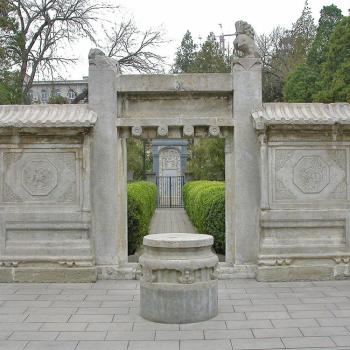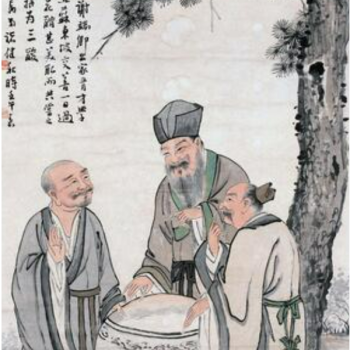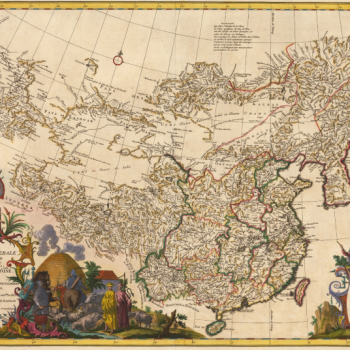We find Isaiah’s template repeated throughout the Jewish scriptures. Jeremiah may be one of the more dower figures of Biblical history, with the harangues he aimed at his decadent countrymen lending his name to a whole genre of recriminatory speeches, the jeremiad, but one finds more than doom and gloom in the Book of Jeremiah’s pages. For Chapter 30 opens onto a long prophecy of the coming messianic age. It begins with God promising that “[t]he time is coming when I shall restore the fortunes of my people, both Israel and Judah” (Jer. 30:3). The messiah himself appears only briefly in this account, when the text mentions, “David their king, whom I shall raise up for them” (Jer. 30:9). But there is not much that he seems to do personally. Mostly, his placement on the throne is simply another of the seemingly impossible actions God performs, such as gathering the lost tribes of the north, that completely restore Israel to the golden days of its pre-exilic youth.

Jeremiah’s focus, then, is not on the individual man who is chosen by God for the seat of David. Rather, it is the future glories of Israel under messiah’s rule, as well as God’s awesome benevolence and power shown in bringing them about, which form the heart of this prophetic utterance. As noted, God will do the previously unthinkable. The northern tribes will return—“See how I bring them from a northern land; I shall gather then from the far ends of the earth” (Jer. 31:8)—and there shall be universal prosperity—“I shall satisfy the priests with the fat of the land and my people will have their fill of my bounty” (Jer. 31:14)—along with limitless happiness and rejoicing. The Israelites’ moral character will be made perfect and their relationship with God will begin anew, “I shall establish a new covenant with the people of Israel and Judah. It will not be like the covenant I made with their forefathers … I shall set my law within them, writing it on their hearts; I shall be their God and they will be my people” (Jer. 31: 32-33). Indeed, the very structure of society will be completely remade for “the Lord has created a new thing in the earth: a woman will play a man’s part” (Jer. 31:22)—one can only imagine what conservative Christians who balk at the current transformations in gender roles and gender expression must think of this line. Thus, what we have in the Book of Jeremiah an impressive and very full picture of the messianic age and yet, ironically, it is one in which the messiah’s own part is quite minor.
But this is not to discount the messiah’s importance to this vision or to downgrade Jeremiah in the line of transmission that leads from Isaiah up to modern Judaism and Christianity. For while the messiah may pale in comparison to the prophecy’s true hero, God Himself, the mere fact that he is mentioned at all is significant. That the restoration of David’s line occurs at all when the prophecy’s own internal logic does not require it demonstrates that it was already becoming impossible to think of Israel without thinking of a new Davidic kingship and the man who would hold it. And because the mention of the new David occurs at the beginning of this prophecy, it reinforces the notion that the messianic king must come before all the things which are promised afterward can be fulfilled.
What is more, though he is not shown doing much of anything, the mere reference to the messiah as “David” marks him out as a significant and heroic figure. It is not enough to assume that the messiah is called David simply because of his Davidic descent, though obviously that is what qualifies him to rule. That basis alone does not require the identification to be as strong as it is. When read literally, the passage seems to state that the future king will actually be the original David, coming back like a Judaic King Arthur to save his people in their time of greatest need. But this passage has never been interpreted like that, and so it can only be concluded that the new messiah must be someone very much like David, with the same remarkable qualities and an equal share of divine favor. Thus, even Jeremiah does not outright say so, we can only conclude that the new David will play a central role in the future days of Israel.
The Jeremiah prophecy thereby makes several important modifications to the messianic formula that would go on to become standard. In many ways, it is a fuller vision that the one on offer in Isaiah. While both Isaiah and Jeremiah emphasize the restoration of pre-exilic Israel, Jeremiah places a much greater emphasis on Israel’s return to an original state of innocence that existed before the calamities of history overwhelmed it. Thus, there is not only the return of the Jewish people to the environs of Jerusalem, but the above-mentioned reappearance of the lost tribes and the reunification of Israel and Judah. The Israelites will go back to upholding a covenant with God with absolute fidelity, as they should have done from the beginning. There is a sense here that it is not just Israel, but the pristine, original form of Israel that is coming back into existence.
And this original, pristine Israel is also an Israel under the rule of a Davidic king. It did not have to be this way. We have already seen how little it would alter Jeremiah’s prophecy to excise the future monarch entirely. And earlier scriptures would, in a sense, be on his side. A reader versed in the Hebrew scriptures will no doubt recall that in its earliest days, the days of great prophets like Moses and Joshua and heroic judges like Gideon and Samson, Israel knew no king except God. The First Book of Samuel portrays the establishment of the Israelite kingship in a brutally negative light, with God Himself bitterly complaining about the Israelites’ desire to have a king, “they have not rejected you [Samuel, as Judge of Israel], it is I whom they have rejected, I whom they will not have to be their king” (1 Sam. 8:7). Thus, it would be a fair conclusion to assume that an Israel restored to its primordial state and made perfect in God’s eyes would have no place and even no need for a human king.
And yet, the anti-monarchist message of the early parts of the Old Testament, particularly 1 Samuel, were generally ignored through the ages as Judaism and Christianity produced kings aplenty. It fell to Thomas Paine, a confirmed atheist, to revive this message at the dawn of the American Revolution by utilizing a strident anti-monarchist interpretation of the Bible in his famous pamphlet Common Sense. Until then, it had mostly lain dormant across two thousand years of Judeo-Christian thought and belief. While there may need to be no reason for this beyond the fact that those in power will always find a way to silence their critics, it would be hard to imagine that the portrayal of the messianic kingship in texts like the Book of Jeremiah did not at least provide some help in this process. For, by associating the restoration of the Davidic line with the return of the original, unspoiled Israel, Jeremiah makes the kingship itself, so derided in 1 Samuel, a key component of that return to primordial perfection. Rather than an innovation God reluctantly allowed because of His chosen people’s own obstinance, the kingship becomes central to both Israel as it is meant to be and to God’s intentions for the final state of being. The concept of monarchy, and of one particular earthly monarch, can now no longer be said to be against God’s design, for Jeremiah’s prophecy writes it directly into the conclusion God has already written for the great drama of history.
But Jeremiah offers a second, and perhaps more radical, innovation. It is evident that there is a new element in his portrait of the messianic age. Isaiah, with his image of desolate wildernesses becoming gardens, focused on physical transformation and material plenty. There is certainly material abundance to be found in Jeremiah, but the key transformation here is not physical. It is spiritual and moral. The locus of Israel’s regeneration is not just the land itself, but the hearts of the people who inhabit it. The Israelites themselves will be changed. There will be no more breaking of the covenant, for the Israelites will have God’s law written “on their hearts.” Instead of simply a set of external commands to follow, the law will become part of their very nature. And this inner refashioning is not simply a personal one, for it radiates outward, changing the fabric of Israelite society and the very nature of their relationship to God. For God will form “a new covenant” with his regenerated people and they shall inhabit a society in which “a woman will play a man’s part.” Everything shall look completely different from how it did before. Transformation of the world is a key part of any eschatological work, but here in Jeremiah we see the deepening of this idea. There shall not be a single aspect of human life that shall not be made anew by God’s hand. In the world of the “new covenant,” humanity itself will be completely different that what it was before.
The importance of this development cannot be understated. This spiritualization of the messianic ideal seems natural to us today. It is, after all, the path Christianity has taken in explaining how Jesus of Nazareth, a man who lived in poverty and died a criminal, could be the messianic king of Jewish prophecy. But this spiritual interpretation had to come from somewhere before Christianity could claim it as its own. And we see the first intimations of it here in the Book of Jeremiah. The perfection of the chosen people’s moral life in the eschaton and the resultant restructuring of society in God’s image would become chief tenants of Christian theology. The idea of complete social transformation and the beginnings of a new, spiritually mature humanity would reoccur in the work of that greatest of medieval Christian prophets, Joachim of Fiore and would, through him, be passed down to the modern New Age movement. So much of religious thought down to the present day owes much to Jeremiah’s reinterpretation of the messianic age.
And yet, it must strike a reader as something of a contradiction that Jeremiah combined the radical image of a total reshaping of society and of the chosen people itself with an ultimately conservative return to the old Davidic kingship. These two things do not feel like they should go together, especially when God’s earlier opposition to monarchy is brought to mind. And yet, Jeremiah forces them into an uneasy alliance. This too would have a long legacy. Christianity took this merger up wholeheartedly, for the apocalyptic texts of that faith have always had a particular fascination with portraying Christ as a universal absolute monarch. Indeed, the embrace of this particular flavor of messianism would even allow the insertion of a salvific earthly monarch, the Last World Emperor, into the Christian apocalyptic narrative, thereby allowing kings and princes ever afterward to convince themselves that their pursuit of absolute power was itself justified in God’s plan for the end of history.
The obvious conclusion from all this is that the concept of a messianic kingship, whether Jewish or Christian, has long served as a check on the more radical ideas which the Judeo-Christian apocalyptic traditions inevitably give voice to. This conclusion is more than justified, as the image of the purified world as an absolute monarchy has long been used to validate the imperfect social hierarchies which must precede it. Few prophets and diviners of the tradition have avoided falling into the trap and neutering the revolutionary possibilities which make the promise of the eschaton so exciting. Joachim, though conservative in his own way, managed to do so, stridently refusing to interpret the age to come in monarchal terms. But there have not been many others who could follow his lead. Thus, eschatology’s potential for truly transformative social change has often been overlooked. And while Jeremiah—or, more likely, the post-exilic author writing in his name—does not constrain his prophecies to comfort the powerful, he lays the groundwork for others to do so. Perhaps without ever intending to, he has set the trap that so many later would-be prophets have fallen into. It is a trap which we should be mindful of as we continue our own exploration of the messianic idea and its evolution.
Works Cited
The Book of the Prophet Jeremiah. The Oxford Study Bible, edited by M. Jack Suggs, Katharin Doob Sakenfeld, and James R. Meuller. New York: Oxford University Press, 1992. 778-847.
The First Book of Samuel. The Oxford Study Bible, edited by M. Jack Suggs, Katharin Doob Sakenfeld, and James R. Meuller. New York: Oxford University Press, 1992. 277-310.











